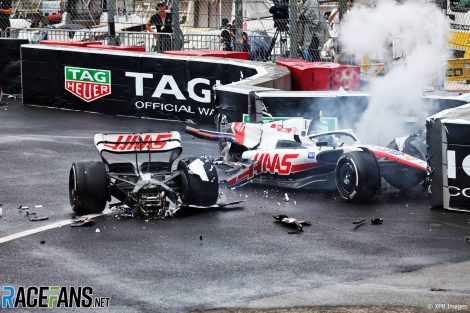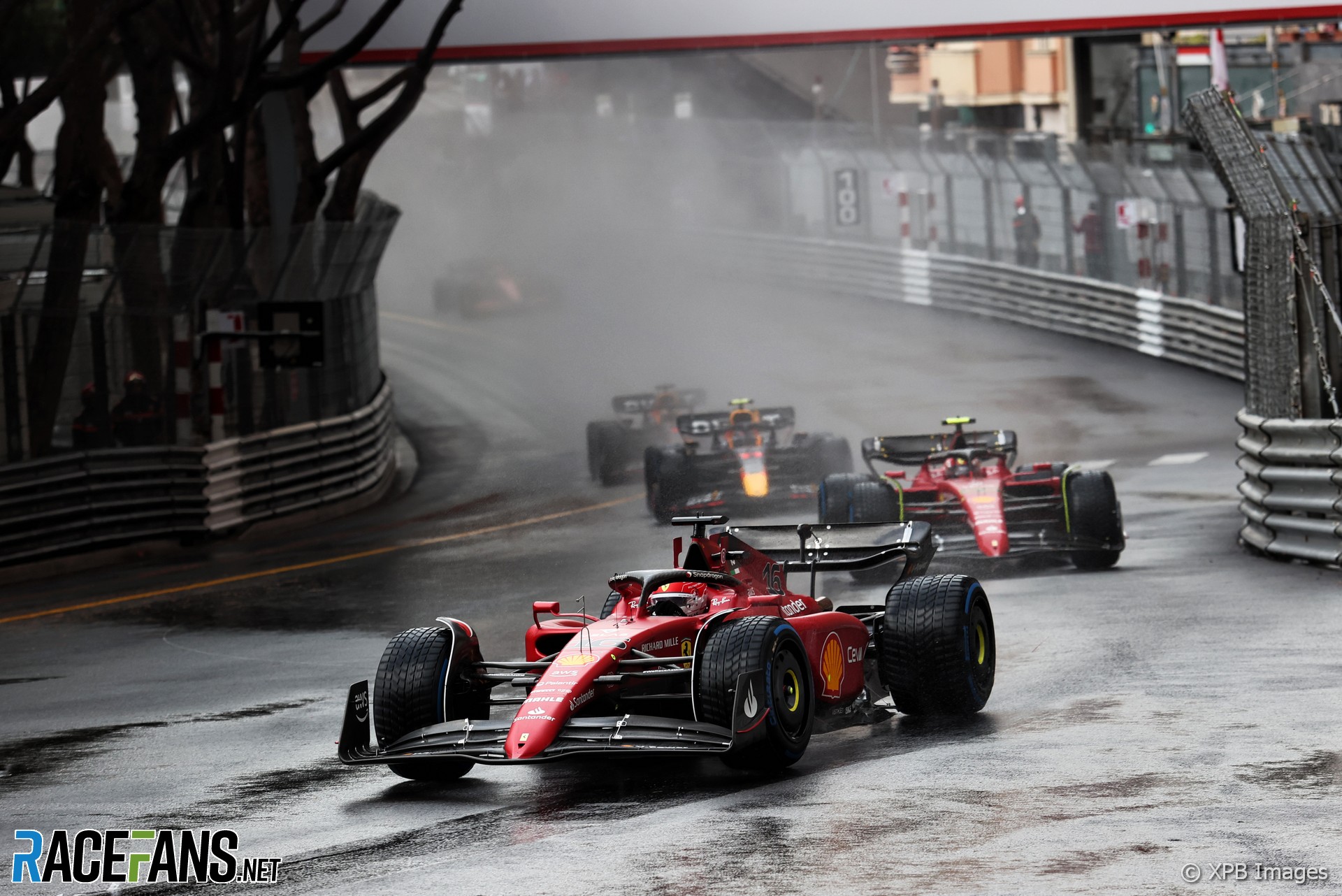The FIA should review whether the decision not to start the Monaco Grand Prix on time was correct, says Red Bull team principal Christian Horner.
The starting procedure for Sunday’s race was aborted as rain fell on the track shortly before the formation lap was due to begin.The conditions were judged safe enough for the cars to be sent away for a formation lap behind the Safety Car nine minutes later than scheduled. However the rain then intensified to the point that the cars were summoned into the pits and the start was delayed.
That downpour caused an electrical problem with the starting gantry which further delayed the beginning of the race. The start was eventually given over an hour later than planned.
The FIA said the original decision to delay the start was made because drivers had not previously driven on a wet track during the weekend. Several of them took issue with that, including Kevin Magnussen, who complained: “This is professional drivers, Formula 1, it’s not WEC.”
Horner said the delay to the start of the race “needs a bit of a review because it was a little chaotic with tyres coming on the grid, off the grid.”
“It’s a busy enough grid here and it’s always a little dangerous to try and pre-empt the weather,” he added.
“You can argue it both ways. You could say we’d have been better starting the race, then reacting to the downpour and either putting the Safety Car out or stopping the race. But I think it needs a bit of a review after this weekend.”
Advert | Become a RaceFans supporter and
Formula 1 has made several changes in race control this year, including the introduction of two new race directors to the series. World Endurance Championship race director Eduardo Freitas was in charge of a grand prix for the second time this year in Monaco.

Lewis Hamilton was also among the drivers who did not agree with the decision not to begin the race on time. However Mercedes team principal Toto Wolff was satisfied with the handling of the original start.
“The rain at the beginning was torrential,” he said. “I don’t think that you can start the race with thunderstorms moving into Monaco like this.
“So I have no beef at all with the start having been delayed a few times. And you need to give the race directors the credit that this was a very, very difficult race to manage.”
Wolff admitted he “would have hoped for an earlier start” following the downpour, but noted this was due to the electrical problems caused by the heavy rain.
“Overall the format, how it was, was more an American football game so you can get four hotdogs and beer in between,” he added. “But I think at the beginning there was nothing else it could have been done.”
Advert | Become a RaceFans supporter and
2022 Monaco Grand Prix
- Whatever triggered it, Verstappen’s defiance of his own team makes little sense
- Transcript: How Red Bull seized a win that ‘Ferrari looked like they had in the bag’
- Verstappen now has as many poles as Leclerc – but six times as many wins
- Schumacher’s chassis-splitting crash shows effects of rising car weight – Alonso
- Norris still can’t drive McLaren the way he wants to, despite strong results





Sonny Crockett (@sonnycrockett)
31st May 2022, 11:11
Next, the FIA will be telling us that the Monaco GP was delayed because a load of Liverpool fans stormed the gates with fake tickets.
I have a strong feeling that F1 and the FIA are moving in completely different directions.
ian huntington
31st May 2022, 11:52
yes, its moving into an american direction and all that comes with it……….after that at some point, a little race will be held, and after a few more americanised destructive years raping of F1, half of them will be street races in mostly american cities and very few on actual purpose built tracks, we have already lost some great ones, Hokenheim, Nurburgring just to mention German. We have to face facts, Ecclestone sold F1 out to the ‘mericans and we have lost it. My only hope is that they push and take too much and the 90% of teams that are European decide to split and start again and leave them to fill their boots with indy car drivers
Mayrton
2nd June 2022, 8:21
Absolutely. Liberty primarily looks at F1 as a money maker. That is their core objective. Internally they would state this objective can easily be combined with the sportiveness of it all, but in practice they are willing to sacrifice here and there to comply to their primary objective. Since their company values and core are based on US culture this inevitably means circusfying.. at least to the rest of the worlds perspective. In their eyes they reach out to their audience and improve the show. This is clearly a cultural difference driven transition.
Jere (@jerejj)
31st May 2022, 11:30
Damn right.
Antz (@antznz)
31st May 2022, 12:05
I feel like the right thing to do is start the race and red flag it when weather becomes an issue. Why race at all with the amount of risk aversion we’re seeing. The risk aversion is really weird and inconsistent, like Miami not installing techpro and then here not starting on a slightly damp track.
I don’t know if its the FIA or F1 that’s the problem but they’re both appearing more and more amateur each weekend lately..
It could be exacerbated by street circuits that aren’t ideal for F1 – limited room for track, facilities and support infrastructure etc…
David BR (@david-br)
31st May 2022, 13:43
@antznz +1
Problem is on more traditional tracks too we don’t get to see racing because it’s ‘dangerous because of the spray’. If that’s the case, then surely the wet weather tyres need redesigning. The more F1 avoids racing in the wet, the less experience it will have coping with the conditions, and the more risk averse it will become. It really saddens me because I think a few wet weather races add real spice to the season, rewarding particular driver skills and allowing those driving slower cars a real chance to get on the podium or even win.
The same goes to the risk aversion with cars parked on the side of tracks. Often they’re in a safe spot with little or no chance of causing any additional danger, but still we get VSCs, SCs or even red flags to remove them (as we know, the real danger is cranes on track while the racing continues).
Esploratore (@esploratore1)
31st May 2022, 14:49
Absolutely, I really miss old school wet races, without constant SC etc.
davidhunter13 (@davidhunter13)
31st May 2022, 16:01
Totally agree. I know safety is paramount but then we should just stop racing completely as it is inherently dangerous? The cars and drivers are safer than they’ve ever been so it would be nice to see some excitement in the wet, rather than endless SC laps.
Red Andy (@red-andy)
31st May 2022, 12:05
I don’t really understand what the point of starting on time would have been, if the subsequent downpour would then have necessitated a red flag. As F1 is now a de facto dry weather sport it’s hard to see how a few laps of green flag running at the start would have made matters any less farcical.
Unless Horner is saying that the race should have started as normal, with drivers expected to adapt to the conditions and safety cars and/or red flags deployed only to clear away the cars of those who were unable to do so. That’s a position I would agree with, but it’s so far out of step with modern F1 that it hardly seems worth arguing for.
Simon (@simon999)
31st May 2022, 12:23
The difference is that starting on time means not relying on a prediction of the future that may or may not come to pass. By delaying, they were trying to predict the future. Yes, they got the prediction right, but relying on future predictions is never a sound idea.
“Be on the right tyre at the right time” comes to mind as the right mindset here. If the current conditions are good for racing, you go racing, and you deal with changes in those conditions as they happen. You shouldn’t try and predict what might happen beforehand, IMO.
S
31st May 2022, 12:46
With this year’s “increase in resources” for race control – it may be that they now think they can predict the future, just like the teams.
David BR (@david-br)
31st May 2022, 13:45
@red-andy
So it seems. But who exactly decided that?
StefMeister (@stefmeister)
31st May 2022, 14:09
I get the reasoning but i’m not sure i necessarily agree with it as I think you need to make decisions based on the conditions as they are and not what may be coming.
If the subsequent delay after the heavy downpour was indeed caused by electrical issues then that was more understandable although could/should have been communicated to everyone so we weren’t all sitting around wondering why no cars on track despite conditions seeming to be fine.
hamiledon
31st May 2022, 21:14
FIA should review the relationship between RBR Albon Latifi and Wiliams. FIA should review the favorable attitude towards RBR shown by stewarts.
Webber fan
1st June 2022, 10:26
Ever since Jules Bianchi’s crash and eventual death the FIA have become too paranoid to allow races to start in wet conditions.
TOADY
1st June 2022, 12:41
It is up to teams to create a good strategy around their prediction. Race control should just focus on getting as much racing in as long as it is safe. In the first 10 minutes of the would-be Grand Prix, it would have been safe to race. You can always throw a red flag if the situation changes.
It also doesn’t help cars don’t get to clear the track from water with their amazing wet tyres. I reckon there’s a chance there wouldn’t have even been a red flag during the brief period of heavy downpour because the extreme wets would have cleared the standing water from before.
This also annoyed me to bits last year in Spa. I’d have much preferred running behind the safety car for 15 laps to help clear the track and increase the drivers’ confidence, as well as being able to quickly change to race conditions when the opportunity rises. Charlie Whiting did this better, I feel.